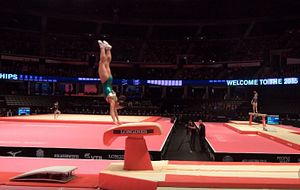Oksana Chusovitina, a Bukhara-born gymnast, has been competing longer than many of her competitors have been alive. At 41, she is among the oldest Olympians appearing in the 2016 Rio Games and will be the oldest gymnast to compete in history of the modern games, stretching back to 1896. Last weekend she qualified for the finals in women’s vault, ranking fifth after the United State’s 19-year old Simone Biles; North Korea’s 27-year-old Hong Un-jong; Giulia Steingruber, 22, of Switzerland, and Russia’s Maria Paseka, 21.
While not the oldest athlete at Rio–that honor seems to belong to 61-year old Australian equestrian rider Mary Hanna–Chusovitina has other records to set: Rio is her 7th Olympic Games.
Between the 1896 Athens Games in the 2012 London Games, only 488 athletes had competed in at least five games. Only 18 athletes in that period had appeared in at least seven games. Of those with such record-setting numbers of games, many competed in disciplines like shooting, equestrian, and sailing, events in which skills are honed with time and physical demands manageable with age. In gymnastics, a sport that is hard on the joints and trends younger, only five people have competed at the Olympic level at more than five games.
Chusovitina’s path through a record seven Olympic Games is the product of both history and twists of fate.
In 1992, a year after the Soviet Union dissolved, the then-former states of the USSR (minus the Baltics) competed together for a final time as the Unified Team. Four years prior, Chusovitina had won the all-around title in the junior division at the USSR National Championships; she was 13. At her first Olympics in 1992, she struck gold, with the United Team winning the team competition in gymnastics; Romania took silver and the United States took bronze.
In the next three Summer Olympic Games–1996 in Atlanta, 2000 in Sydney, and 2004 in Athens–Chusovitina competed under the flag of Uzbekistan. While Chusovitina continued to perform well in international competitions, the training facility in Tashkent was dilapidated. A fan website from 2000 (captured by the Wayback Machine) shows pictures of the Uzbek team training in 1999. “None of the current Team UZB gymnasts perform Yurchenko vaults due to lack of safety pads for the springboards and the absence of a foam pit,” the site notes. Instead, Chusovitina has flown into the air in the vault using what’s called a Tsukahara vault. The Tsukahara is an older-style vault and most modern competitors use the Yurchenko.
ESPN reports that Chusovitina is one of the few female gymnasts who have competed using the “the famed, and controversial, Produnova vault.” Also called the “Vault of Death” because of its difficulty and the serious risk of injury if done incorrectly, Chusovitina is expected to attempt it in Rio. If she nails it, the difficulty score of 7.0 could blow away the expected winners. Biles, the 19-year-old American favorite, uses what’s called an Amanar vault, which comes with a 6.3 difficulty score. In a game of decimal points–only 1.050 separated Chusovitina from Biles in the qualifier–the difference could be monumental.
In the early 2000s, life intruded into Chusovitina’s career in Uzbekistan. Chusovitina had married a fellow Olympian, Uzbek wrestler Bakhodir Kurbanov in 1997. In 1999, their son Alisher was born. Three years later he was diagnosed with acute lymphocytic leukemia and the family moved to Germany to seek the best treatment available. While in Germany, Chusovitina began training with the German team and Uzbekistan released her to compete with the Germans in 2003. But due to German laws mandating three years of residency before granting citizenship, she still competed for Uzbekistan in 2004.
In 2008, Chusovitina went to Beijing under the German flag and brought home her first individual Olympic medal: a silver in vault.
Continuing to perform well internationally–winning medals in various World Championships–it looked like Chusovitina would retire ahead of London. But she didn’t, going on to compete for Germany a second time. After placing fifth in vault at London, Reuters ran a triumphant headline: “Gymnastics: Chusovitina ends inspirational career happy, healthy.” The report noted that Chusovitina’s remarkably long career had been prompted by her son’s illness–prize money and support from the gymnastics community had made paying for his treatment possible. “”I’m happy. I’m not injured. I’m healthy and I’m a mummy. Now I’m going to lead a completely normal life with my son,” she said at the time.
But the call of competition sounded. When Chusovitina takes to the mat this weekend she has a serious shot at making the podium. If she does, the Uzbek flag will fly to the tune of the national anthem.

































